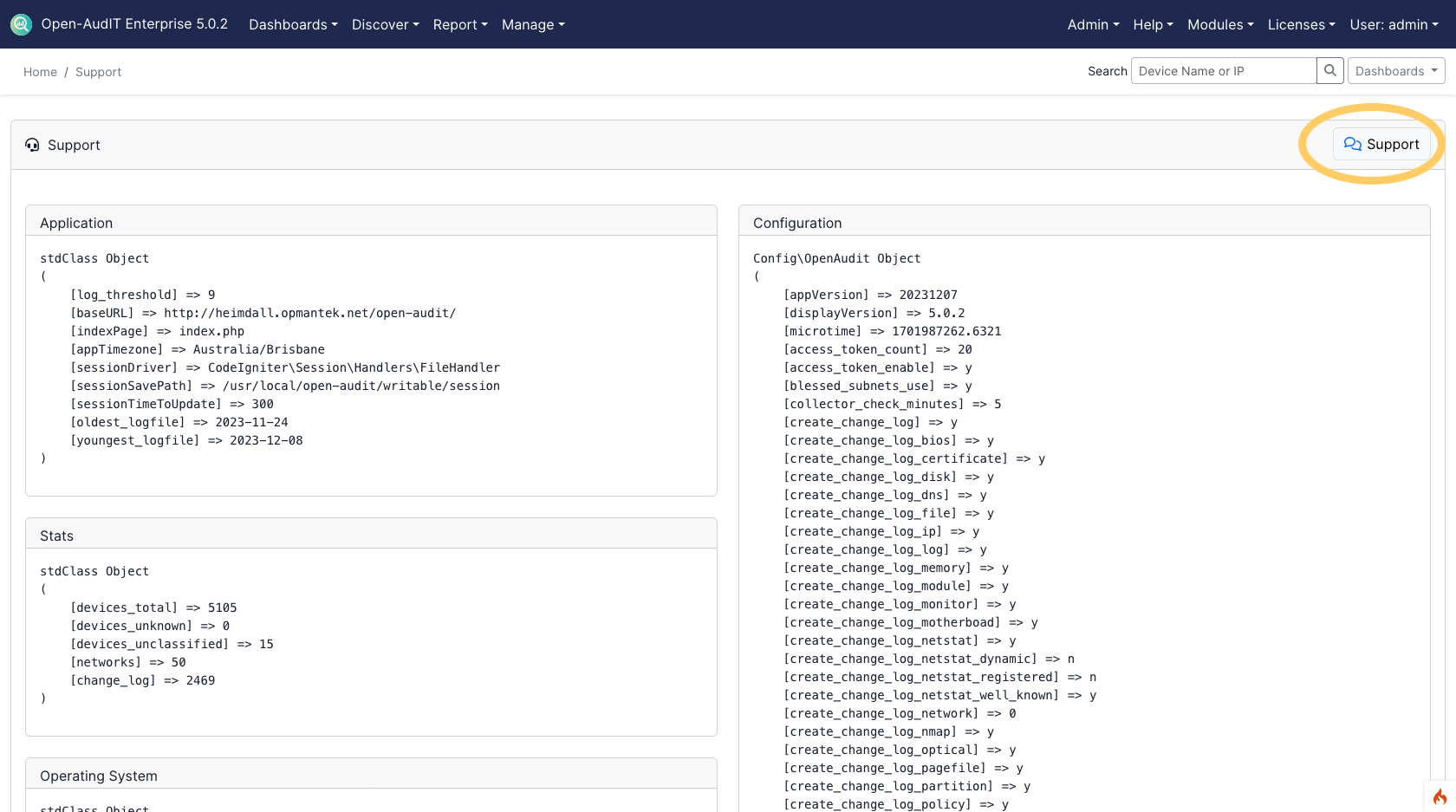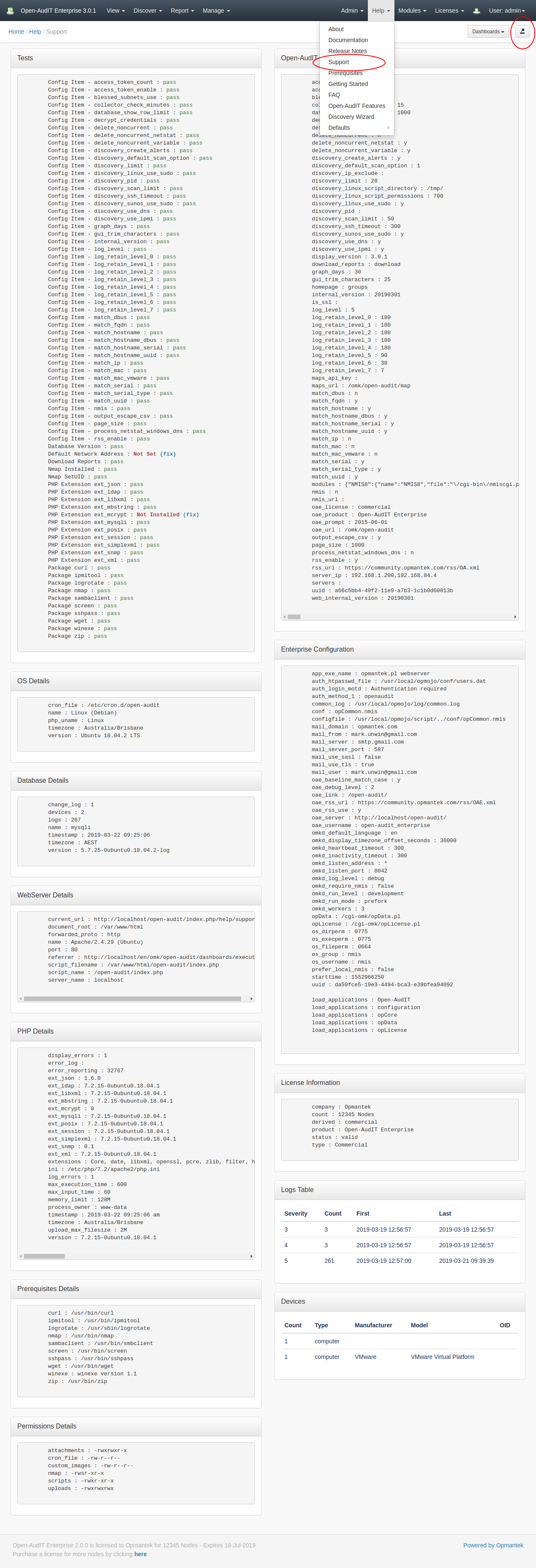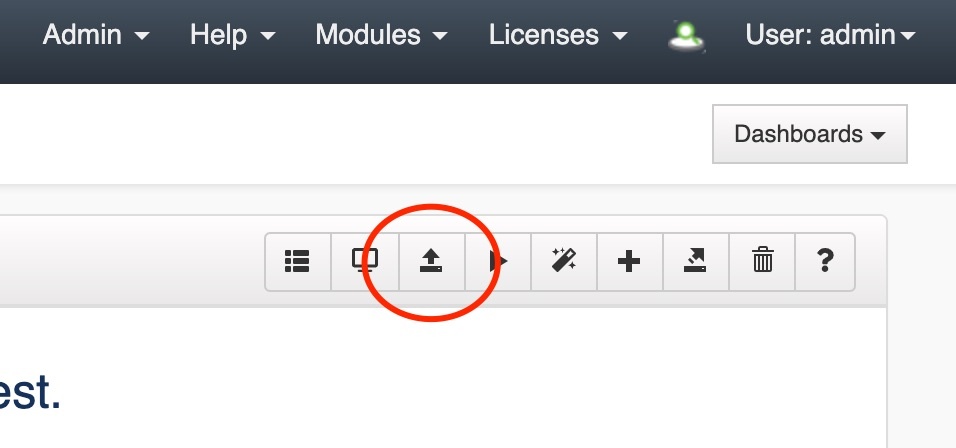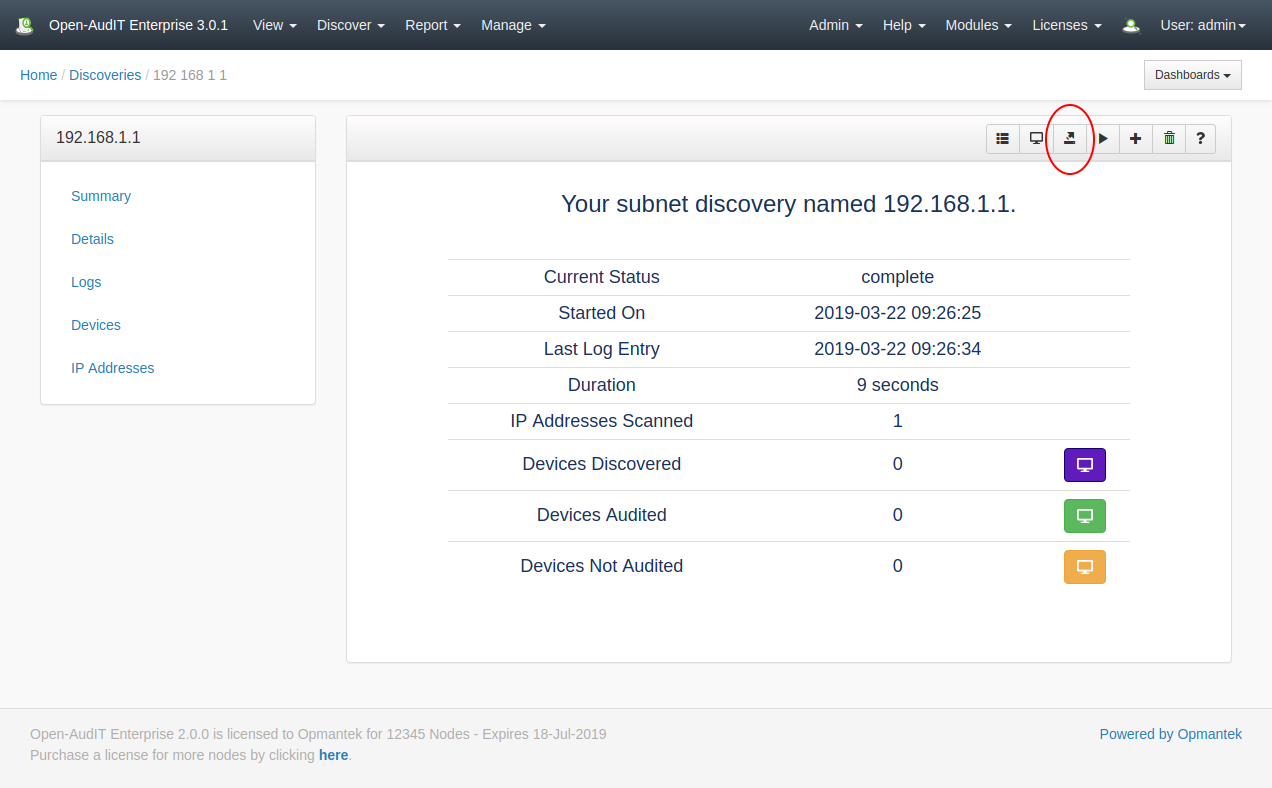The Support Page
| Table of Contents | ||
|---|---|---|
|
...
Opmantek will usually request the Install Support JSON file and (if required) the Discovery Support export file. These allow us to examine more closely how your server is operating, without the need for an initial set of back-and-forth questions (saving both you and Opmantek time).
Install Support
From version 1.3.2 Open-AudIT includes a page titled Support. It is available at Menu -> Help -> Support. This is to be used as the first point of call when troubleshooting Open-AudIT issues. You can click the Export button on the top right to retrieve this as a JSON file (to be added to the support ticket / email.
5.0.0 and newer screenshot
Pre 5.0.
...
0 screenshot
Discovery Support
When investigating a Discovery, support will request the Exported Discovery Logs. To retrieve these, go to menu -> Discoveries -> List Discoveries. View the discovery in question, then click the Support button in the top right toolbar.
This will provide the discovery settings, config items, the discovery device list as well as the logs for this particular discovery.
5.0.0 and newer screenshot.
NOTE - As at version 3.3.0, the icon will change to the below.
Below is for versions prior to 3.3.0.
LDAP Support
If you're having trouble looging in to Open-AudIT using LDAP, the following will help diagnose what the issue is.
Log on to the console of the Open-AudIT server and run the below to increase the log level.
Windows
| Code Block |
|---|
c:\xampp\mysql\bin\mysql.exe -u openaudit -popenauditpassword openaudit -e "UPDATE configuration SET value = 7 WHERE name = 'log_level';" |
Linux
| Code Block |
|---|
mysql -u openaudit -popenauditpassword openaudit -e "UPDATE configuration SET value = 7 WHERE name = 'log_level';" |
Next, attempt to log in to Open-AudIT using your LDAP account. Assuming that fails, go back to the console and run the below.
Windows
| Code Block |
|---|
c:\xampp\mysql\bin\mysql.exe -u openaudit -popenauditpassword openaudit -e "UPDATE configuration SET value = 5 WHERE name = 'log_level';"
c:\xampp\mysql\bin\mysql.exe -u openaudit -popenauditpassword openaudit -e "SELECT * FROM logs;" > logs.txt |
Linux
| Code Block |
|---|
mysql -u openaudit -popenauditpassword openaudit -e "UPDATE configuration SET value = 5 WHERE name = 'log_level';"
mysql -u openaudit -popenauditpassword openaudit -e "SELECT * FROM logs;" > logs.txt |
Next, attach the logs.txt file to your support email or Jira ticket.
Feel free to look through the logs.txt file for entries with a severity level lower than 7 (7 is debug). Any actual problems should usually be logged with a level lower than 7, but for completeness, a 7 is best when trying to find an issue.
Function
This page retrieves various system details and variables. It then runs several tests upon the results and suggests various fixes.
This information is also available to email to Opmantek from a link on the page, along with links to download various files from the Open-AudIT server for inclusion as attachments to the email.
Variables
The currently retrieved variables are (below contain sample data as values):
Array
(
[web_internal_version] => 20170620
[web_display_version] => 2.0.1
[base_url] => http://localhost/open-audit/
[index_page] => index.php
[uri_protocol] => REQUEST_URI
[url_suffix] =>
[language] => english
[charset] => UTF-8
[enable_hooks] =>
[subclass_prefix] => MY_
[permitted_uri_chars] =>
[enable_query_strings] =>
[controller_trigger] => c
[function_trigger] => m
[directory_trigger] => d
[log_threshold] => 0
[log_path] =>
[log_date_format] => Y-m-d H:i:s
[cache_path] =>
[encryption_key] => openaudit
[sess_cookie_name] => openaudit
[sess_expiration] => 7200
[sess_encrypt_cookie] => 1
[sess_use_database] => 1
[sess_table_name] => oa_user_sessions
[sess_match_ip] =>
[sess_match_useragent] => 1
[sess_time_to_update] => 300
[cookie_prefix] =>
[cookie_domain] =>
[cookie_path] =>
[global_xss_filtering] =>
[compress_output] =>
[time_reference] => local
[rewrite_short_tags] =>
[proxy_ips] =>
[blessed_subnets_use] => y
[default_network_address] =>
[delete_noncurrent] => n
[discovery_create_alerts] => y
[discovery_ip_exclude] =>
[discovery_linux_script_directory] => /tmp/
[discovery_linux_script_permissions] => 700
[discovery_nmap_os] => n
[discovery_use_dns] => y
[discovery_use_ipmi] => y
[display_version] => 2.0.1
[download_reports] => download
[graph_days] => 30
[homepage] => groups
[internal_version] => 20170620
[logo] => logo-banner-oac-oae
[log_level] => 5
[log_retain_level_0] => 180
[log_retain_level_1] => 180
[log_retain_level_2] => 180
[log_retain_level_3] => 180
[log_retain_level_4] => 180
[log_retain_level_5] => 90
[log_retain_level_6] => 30
[log_retain_level_7] => 7
[maps_api_key] => AIzaSyAhAUqssRASeC0Pfyx1TW1DXRmboG5bdG0
[maps_url] => /omk/open-audit/map
[match_dbus] => n
[match_fqdn] => y
[match_hostname] => y
[match_hostname_dbus] => y
[match_hostname_serial] => y
[match_hostname_uuid] => y
[match_ip] => n
[match_mac] => n
[match_mac_vmware] => n
[match_serial] => y
[match_serial_type] => y
[match_uuid] => y
[nmis] => n
[nmis_url] =>
[oae_license] => commercial
[oae_prompt] => 2017-06-28
[oae_url] => /omk/open-audit
[page_refresh] => 300
[process_netstat_windows_dns] =>
[rss_enable] => y
[rss_url] => https://community.opmantek.com/rss/OA.xml
[uuid] => 980906d2-5994-11e7-a4a3-1c1b0d60813b
[modules] => {"NMIS8":{"name":"NMIS8","file":"\/cgi-bin\/nmiscgi.pl","link":"\/cgi-nmis8\/nmiscgi.pl","url":"https:\/\/opmantek.com\/network-management-system-nmis\/"},"opAddress":{"name":"opAddress","file":"\/bin\/opaddress-cli.pl","link":"\/omk\/opAddress\/","url":"https:\/\/community.opmantek.com\/display\/opAddress\/Home"},"opCharts":{"name":"opCharts","file":"\/public\/omk\/js\/opCharts_a_external_packed.js","link":"\/omk\/opCharts","url":"https:\/\/opmantek.com\/opcharts-dashboards-charts-management\/"},"opConfig":{"name":"opConfig","file":"\/install\/opconfigd.init.d","link":"\/omk\/opConfig","url":"https:\/\/opmantek.com\/network-configuration-management-opconfig\/"},"Open-AudIT":{"name":"Open-AudIT","file":"\/bin\/oae-tasks.sh","link":"\/omk\/open-audit\/","url":"https:\/\/opmantek.com\/network-audit-software\/","installed":true,"version":"2.0.1"},"opEvents":{"name":"opEvents","file":"\/install\/opeventsd.init.d","link":"\/omk\/opEvents\/","url":"https:\/\/opmantek.com\/opevents-traps-network-event-management\/"},"opFlow":{"name":"opFlow","file":"\/bin\/opflow-cli.pl","link":"\/omk\/opFlow","url":"https:\/\/opmantek.com\/netflow-analyzer-collector-opflow\/"},"opHA":{"name":"opHA","file":"","link":"\/omk\/opHA","url":"https:\/\/opmantek.com\/distributed-network-management-system\/"},"opLicensing":{"name":"opLicensing","file":"\/lib\/opLicense.pm.exe","link":"\/omk\/opLicense","url":"#"},"opReports":{"name":"opReports","file":"\/bin\/opreports-cli.pl","link":"\/omk\/opReports\/","url":"https:\/\/opmantek.com\/network-configuration-management-opconfig\/"},"opSLA":{"name":"opSLA","file":"","link":"\/omk\/opSLA","url":"https:\/\/opmantek.com\/ip-sla-monitor-cisco-ipsla\/"},"Other Modules":{"name":"Other Modules","link":"https:\/\/opmantek.com\/network-management-system-tools\/","url":"https:\/\/opmantek.com\/network-management-system-tools\/"}}
[oae_product] => Open-AudIT Enterprise
[oa_web_index] => /open-audit/index.php
[oa_web_folder] => /open-audit
[timestamp] => 2017-06-27 14:00:43
[server_os] => Linux
[device_count] => 1
[base_path] => /usr/local/open-audit
[ip] => 192.168.1.139
)The tests run against this information are:
- Check the Open-AudIT Enterprise config.
- Check the Linux dependencies installed.
- Check the required PHP modules.
- Check the status of the Linux nmap file (has it had its SUID set).
- Check file permission on the Open-AudIT log file.
- Compare PHP and operating system timezones.
- Check the application environment status
- Count the devices with a 'Production' status and compare to the count of devices in the All Devices Group.
- Check for rows in the database temp table.
- Check for devices with a status not equal to Production.
...




